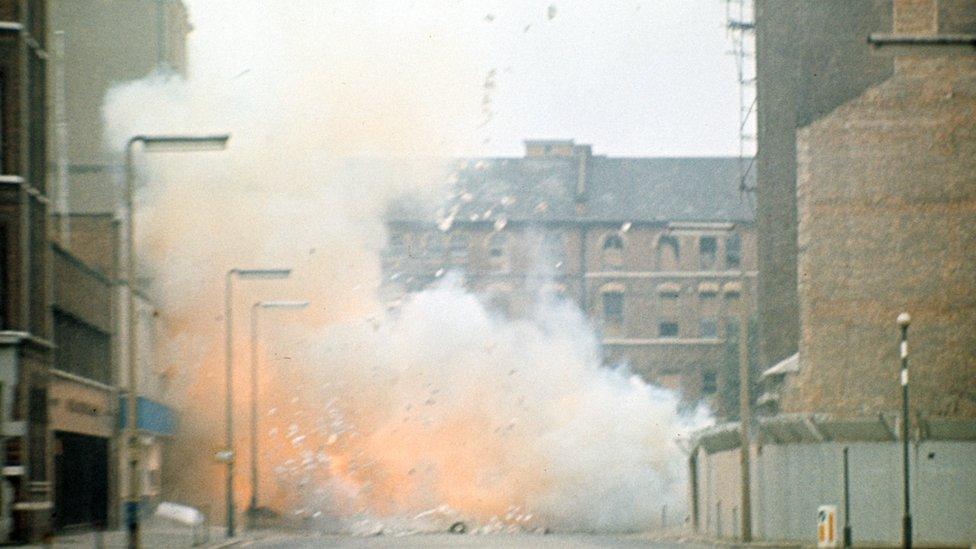Troubles pensions scheme opens for applications
- Published
In separate IRA bomb attacks Jennifer McNern lost both her legs and Margaret Yeaman was blinded
A pension scheme for people who were badly injured during the Troubles has opened for applications.
The start of the Troubles Permanent Disablement Payment Scheme is more than a year behind schedule, having been the subject of political rows.
To qualify, a person must have suffered a severe and permanent physical or psychological injury caused through no fault of their own during the Troubles.
Recipients will receive annual payments of between £2,000 and £10,000.
The UK government and the Northern Ireland Executive have long been at odds about how the scheme will be funded, with the overall costs potentially topping £1.2bn over the next 20 to 30 years.
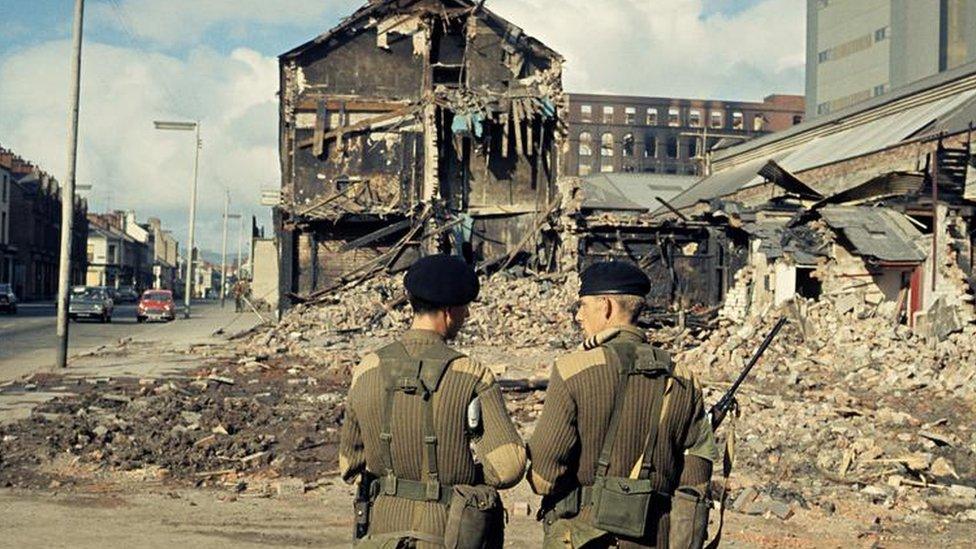
The Troubles claimed more than 3,500 lives and it has been estimated that another 40,000 were injured
Last year a judge ruled Stormont's Executive Office was acting unlawfully in delaying the introduction of the scheme.
He said the start of the scheme was being deliberately stymied in order to pressurise the government into funding it.
He also determined there was an attempt by Deputy First Minister Michelle O'Neill to have the scheme's eligibility criteria changed, with her party, Sinn Féin, having said the rules potentially discriminated against some republicans with Troubles-era convictions.
Funding for the scheme has been agreed for this year, but Stormont ministers still want the government to provide extra cash to help cover future expenditure.
'Triumph for the courageous'
Margaret Yeaman, who was blinded in an IRA bomb in Banbridge, County Down, in 1982, said it had been a "long, bumpy road" for her and others injured during the Troubles who have been waiting for the payments.
"I'll not even say that we're getting it until I have it in my hand," she said.
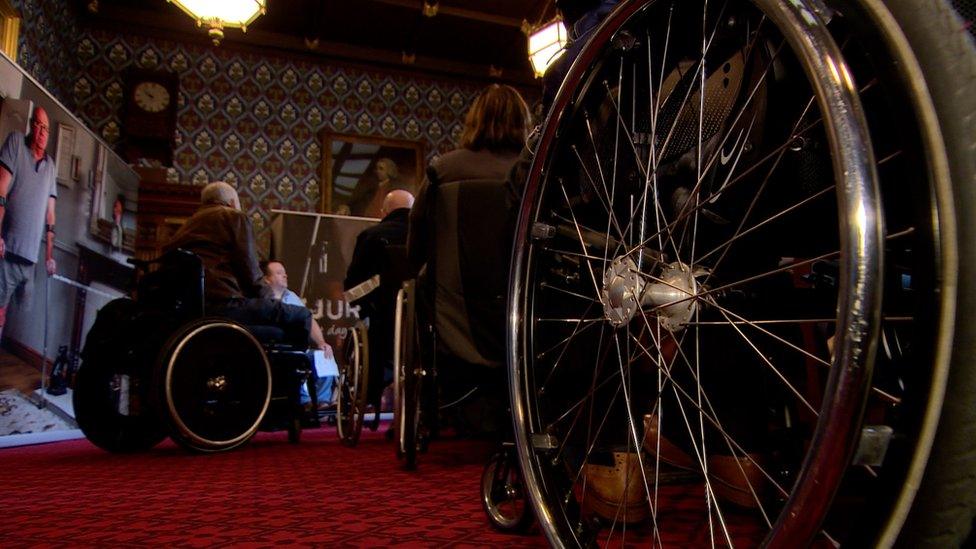
The level of payment through the scheme will depend on the severity of a victim's injuries
Jennifer McNern described the payments as "recognition" of what she had been through since she lost both of her legs after an IRA bomb explosion in Belfast in 1972.
"This is really an acknowledgement of the harm caused physically, psychologically and financially," she said.
The victims' group, the Wave Trauma Centre, said the opening of the scheme was a "triumph for the courageous and determined campaigners who have fought for over a decade" for the payments.
"At times it was desperately frustrating but they never lost their focus on gaining tangible recognition for all those like themselves who had been severely and permanently injured through no fault of their own," said the group's co-ordinator Alan McBride.
"We'll also remember those who campaigned but didn't live long enough to see this day."
The group Relatives For Justice said the qualification criteria for the pension should be extended.
Andrée Murphy, its deputy director, welcomed the initiative but insisted modifications need to be considered.
"It is very possible that a paramedic or a police officer or an eye-witness at a scene will be eligible for a payment and a loved-one who has suffered the deep psychological distress and trauma since then will not be eligible for this," she said.
"That is going to feel unfair and we have to resolve it," she added.
The roots of Northern Ireland’s Troubles lie deep in Irish history
After a series of delays, the scheme was to have opened in June but Mr Justice McAlinden, who chairs the panel overseeing the awarding of the payments, pushed it back until the end of August.
That final delay, he said, was to allow applicants to "familiarise themselves" with "complex" medical assessment guidance before making their submissions.
He said he hopes that money will start being distributed to victims before the end of this year.
'Speedy turnaround for straight-forward cases'
In an interview with BBC News NI, he said he was confident that enough funding would be available for everyone entitled to payments, and he hoped the process would begin soon.
The judge said: "I would hope that there would be a speedy turnaround for non-complex, relatively straight-forward cases.
"We'll just have to see how we measure up to our goals but I would hope that, let's say, it will be within months as opposed to years for the vast majority of applicants to receive determinations from the board."
Asked if this meant that the money would start being paid before the end of this year, he said: "Yes. I would hope so."
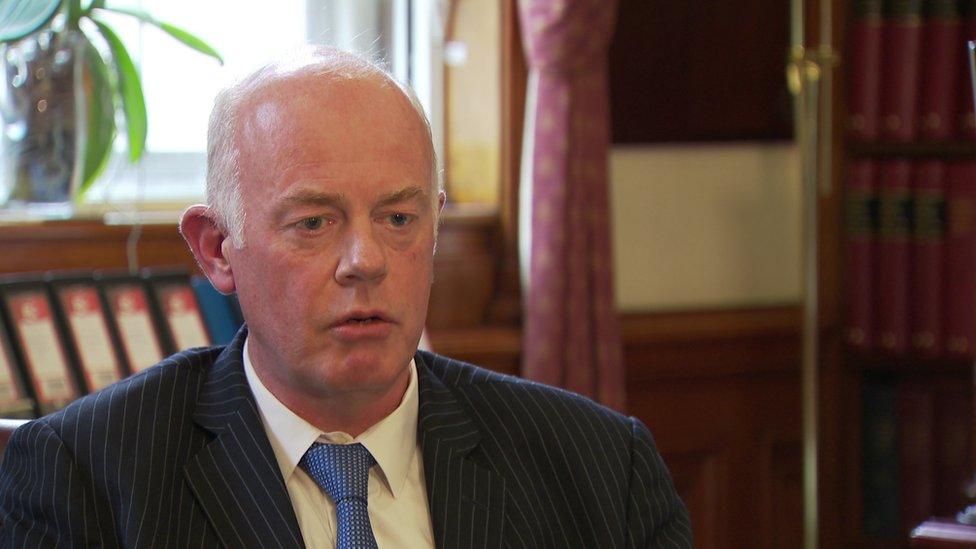
"I'm not worried about the issue of funding," Mr Justice McAlinden told the BBC
Asked about the provision of funding, Mr Justice McAlinden said there was still political "debate, discussion, disagreement as to where the funding will ultimately come from."
But he added: "I have an undertaking, given in court, to the Court of Appeal that in terms of the role of the board, the payments that the board allocate and award, those payments will be met."
The scheme covers violence related to the Troubles between 1966 and 2010, including incidents in Great Britain and Europe.
Non-UK residents injured outside the UK cannot apply, such as victims of the Dublin and Monaghan bombings carried out by loyalists in 1974.
After the death of a recipient, their spouse or carer will get the payments for a further 10 years.
Welcoming the opening of the scheme, First Minister Paul Givan said the scheme would give people who had suffered as a result of the Troubles "the practical support and recognition that they deserve".
Deputy First Minister Michelle O'Neill said it had been "a difficult and painful road for victims and survivors", and encouraged anyone who had suffered permanent physical or psychological disablement as a result of the conflict to make an application.
Justice Minister Naomi Long said it was an important day for all victims and survivors, "but particularly for those who campaigned for this scheme with dignity and commitment for so long".
Related topics
- Published9 February 2021
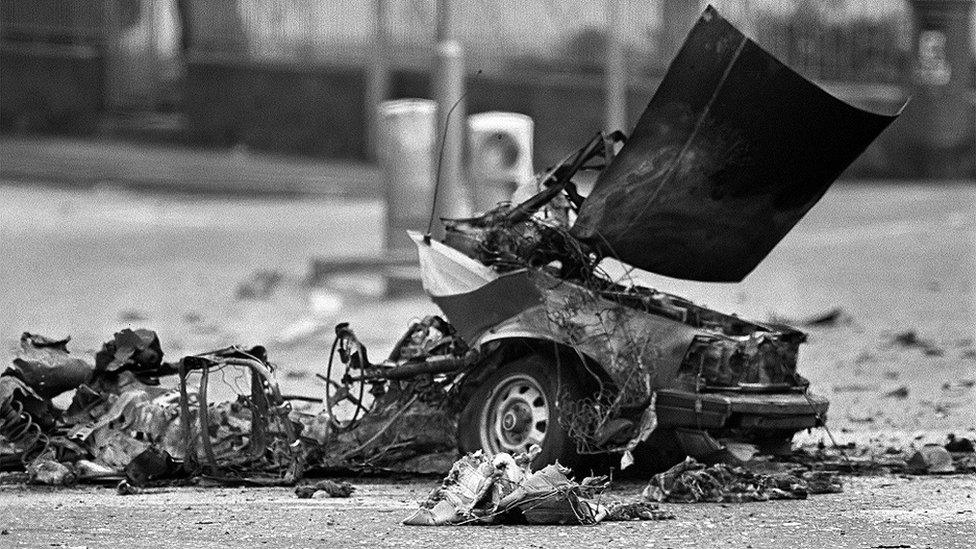
- Published21 August 2020

- Published15 June 2021
